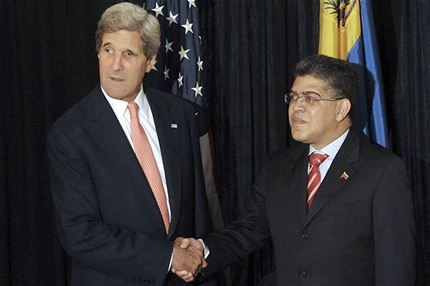The Promise of a New Beginning: A Thaw in U.S.-Venezuelan Relations

The announcement that Venezuelan Foreign Minister Elías Jaua met with U.S. Secretary of State John Kerry on June 5 is extraordinarily good news. The meeting, held in the colonial city of Antigua, Guatemala, came as representatives gathered for the General Meeting of the Organization of American States. Warm smiles and friendly conversation were everywhere. It marks the “start of a good relationship of respect,” offered Jaua, and a step toward creating “a more constructive and positive relationship,” echoed Kerry.
What makes this diplomatic initiative so encouraging is that until this development United States relations with President Hugo Chávez’s (and now Nicolás Maduro’s) Venezuela too often seemed only to feature irate political blasts from both sides. As Chávez moved Venezuela to the left he alienated many in the country’s middle class who had originally supported him and deepened the hatred of the nation’s élites, people who had bitterly mistrusted him from the start. These groups had the ear of the George W. Bush administration, which increasingly hardened its opposition to the Chávez regime. Chávez seemed to delight in enflaming the situation, comparing Bush to the devil or a donkey, and demonizing the United States as a “terrorist state.”
Relations deteriorated as debates grew more fierce and political tensions more unbridgeable. The United States funneled significant funding to the Venezuelan opposition to Chávez through the National Endowment for Democracy. When the coup attempt came in April 2002, the United States Ambassador Charles Samuel Shapiro met with the coup’s front man, Pedro Carmona, providing, in effective, de facto recognition of the coup government. In explaining the U.S. stance on the takeover, one Bush White House briefer challenged the notion that a fair democratic context could ever exist under Chávez, lecturing reporters that democracy means more than “just getting more votes than the other guy,” an odd argument for a Bush administration official to push.
The OAS, meeting in San José, Costa Rica, issued a declaration condemning the coup. The United States refused to join the collective statement. When the Carmona coup fell apart after 72 hours, the United States was left looking ridiculous and dangerously retrograde: isolated diplomatically and determined to turn back the clock to the bad old days of uncritical U.S. support for military coups. Diplomatic relations broke down between the nations, with ambassadors and each other’s officials recalled.
With the start of his administration in 2009, President Barack Obama had several chances to make a fresh start and mend relations. He met with Chávez in Port of Spain, Trinidad in April that year at the Summit of the Americas, calling for “a new chapter” in U.S.-Venezuelan relations. But after the meeting Obama seemed to lose any interest in closer ties, and never showed any real enthusiasm for Latin American issues. Obama appeared to be content to allow inertia to guide U.S. policy for the region. And so the Bush-era policies toward Venezuela rolled on, directionless, unexplored, and unreformed. Even today the two nations have no ambassador-level diplomatic representation.
Given this troubled past, the potential return to diplomatic normalcy is very good news indeed. Despite everything, there remains a good foundation for relations for the two nations to build upon. Trade ties remain strong. Nearly half of Venezuela’s export trade and a third of import trade is with the United States. Venezuela is the 14th largest trading partner of the United States and the fourth largest supplier of imported oil.
President Obama’s most recent hours could be the finest in his policy for the region. It is time for the United States to return to following its best instincts, such as the deeply humane vision that at least initially underlay the Alliance for Progress. President Obama and Secretary of State Kerry have taken an important first step toward the promotion of regional harmony which holds the promise of helping lift Washington back to the high esteem it once had in the region. Venezuela, through the creation of ALBA and other foreign policy initiatives, has now taken the lead in placing poverty reduction and regional economic development at the forefront of the inter-American agenda. The United States should move swiftly to restore diplomatic relations with Venezuela, to join the other American states in recognizing the victory of Nicolás Maduro in the April 14 election, and then join with Venezuela on advancing the goals of poverty reduction and economic development in the hemisphere. There is much to do. At long last, perhaps, there is a beginning.
Dr. Ronn Pineo is a Senior Research Fellow at COHA and Chair of the Department of History at Towson University. This article was written with the collaboration of COHA Research Associate Laura Powell.
Please accept this article as a free contribution from COHA, but if re-posting, please afford authorial and institutional attribution. Exclusive rights can be negotiated.
For additional news or analysis on Latin America, please go to: Latin News and Rights Action

